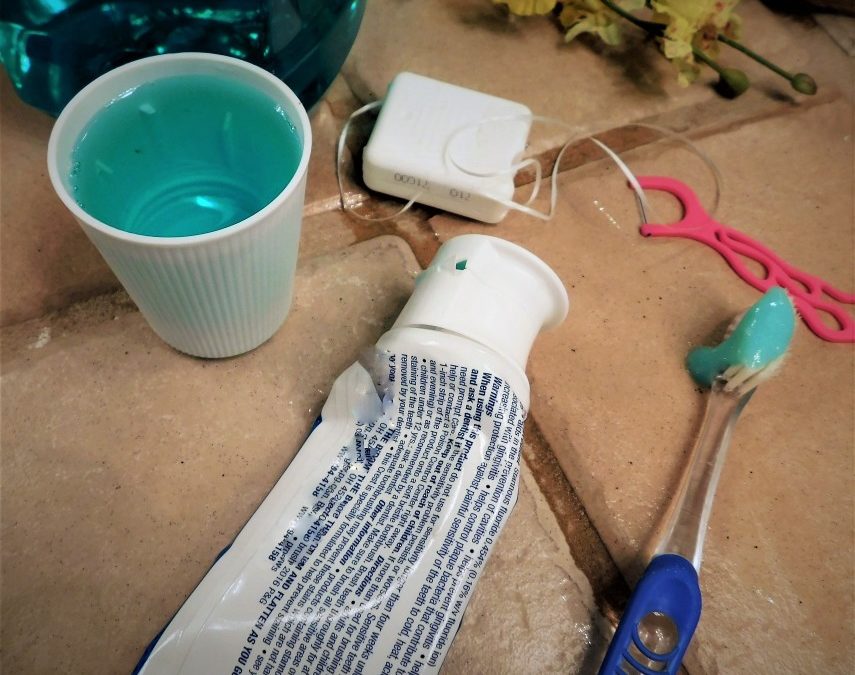You’ve probably heard the same instructions about how to have the best possible oral health for most of your life. Brushing twice a day, flossing, and using mouth wash (along with routine cleanings at the dentist’s office) have become standard, basic instructions for maintaining optimal health for your teeth, gums, and mouth.
But you may not know why these daily practices are so important for more than just preventing cavities (although that’s very important as well). If you’ve wondered why you have to go through this everyday ritual, here are a few reasons each practice plays a vital role in the health of your whole body.
Why Brushing Your Teeth Is Important
- Prevent gum disease
Gum disease begins with inflammation of the tissues holding your teeth in place. If allowed to progress without treatment, it can lead to tooth loss as these tissues deteriorate and break down.
Brushing your teeth helps remove the plaque that builds up around your teeth and gums after you eat. By brushing at least twice a day, you’re combating that build-up and the bacteria that forms around it.
- Fresh breath
Think about it this way. If you let food just sit on your kitchen counter without properly taking care of it, it will start to smell. The same goes for your mouth. If you allow food to just sit in your mouth without taking care of it, your breath (and those around you) will suffer.
- Combat tooth decay
Tooth decay happens when plaque build-up on your teeth eventually creates actual holes in your teeth. Like the aforementioned gum disease, you can help combat this decay by brushing your teeth for two minutes at least twice a day.
- Prevent heart attack or stroke
Your oral health can have an even greater impact on your overall health than you may realize. Bacteria, caused by plaque build-up, from your mouth can make their way into your bloodstream and increase your chance of a heart attack or stroke.
- Remove stains
Coffee and tea are delicious but darken and stain your pearly white teeth. Brushing daily can help remove these surface stains.
Reasons to Floss Your Teeth
- Remove plaque from between teeth
Just like brushing removes food that’s left on your teeth, flossing removes food left between your teeth. Food left trapped in these areas can lead to plaque build-up and cavities between your teeth.
- Prevent gingivitis
Just like brushing can combat gum disease, flossing daily helps remove the bacteria that can lead to inflammation in and around your gum tissues. If you’re pregnant, it’s even more important to do everything you can to fight gum disease as it’s linked to premature and low-weight birth.
- Your smile will look better
We all hate realizing we’ve had food stuck between our teeth for hours, so avoid the embarrassment by flossing regularly.
Reasons to Use Mouthwash
- Kills germs that cause tooth decay
Bacteria in your mouth release acids that cause damage to your teeth. Along with brushing and flossing, using mouthwash kills this bacteria before it can wreak havoc on your oral health.
- Provides a complete cleaning
Your toothbrush and floss can go a long way toward cleaning in and around your teeth, but mouthwash can clean the crevices and tight spaces in your mouth that brushing and flossing miss.
- Promotes healthy gums
Along with damaging your teeth, the acids released by bacteria can inflame your gums, leading to gingivitis and eventual gum disease. When you use an antibacterial mouthwash, you lower the amount of teeth-destroying bacteria in your mouth and lower the risk of getting gum disease and other infections.
- Whitens teeth
There are several types of mouthwash that contain teeth whitening agents like hydrogen peroxide that can contribute to your teeth whitening goals. However, these are not as effective as other pastes, gels, or other substances available to clean stains from your teeth. Along with a whitening mouth wash, the most effective treatment is to visit a dental office for professional whitening.
- Freshens breath
Many types of mouthwash are advertised as a way to freshen your breath with flavors like mint and cinnamon. However, the properties of your mouthwash that get rid of bad breath are working toward the health of your mouth. The antibacterial ingredients in mouthwash attack bad breath-causing bacteria in your mouth, especially on the surface of your tongue. These bacteria release sulfuric substances, leading to foul-smelling breath.
- Reduces toothache pain
If you’re dealing with pain from a cavity and are waiting to have your tooth repaired, mouthwash can help alleviate some of the pain you’re experiencing in the meantime. That is because the pain associated with these types of toothaches are often due to acid-producing bacteria in your mouth. Mouthwash removes this bacteria, thus reducing the pain. While it can’t repair your tooth, using mouthwash can help keep the area around the cavity clean so that it doesn’t get worse.
Family Dentistry at University General Dentists in Knoxville, TN
We’ve all heard the keys to long-lasting oral health are brushing, flossing, and mouthwash. But with a greater understanding of how these practices lead to a healthier you, you can have even more incentive to be diligent to do these every day. Practical, everyday dental care can be simple, and we want to be your guide as you create long-lasting, impactful practices for your long-term dental care.
At University General Dentists, we provide family dentistry services to help keep your loved ones’ smiles healthy and strong. We believe in caring, attentive, and respectful dental care, and we provide everything from routine checkups to extensive dental repairs with the latest state-of-the-art technology.
We have two convenient Knoxville dentist locations. Schedule an appointment at our University of Tennessee Medical Center office at 865-305-9440 or our West Knoxville office at 865-500-5700.

